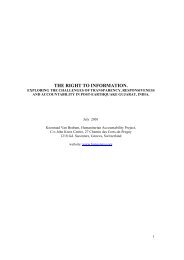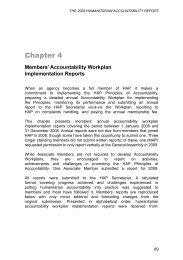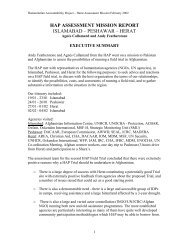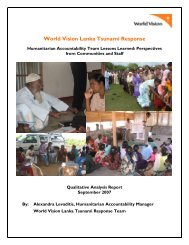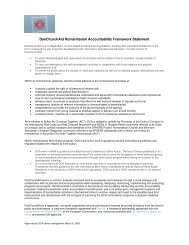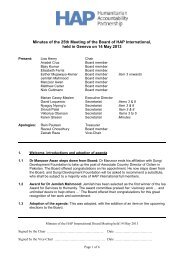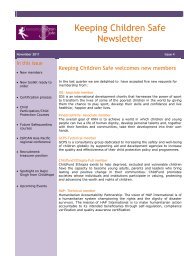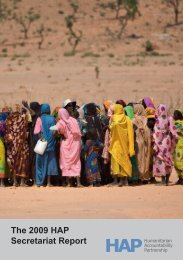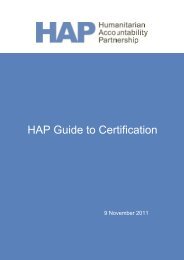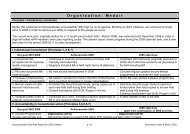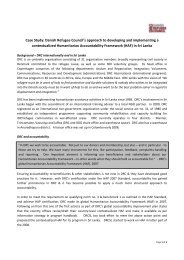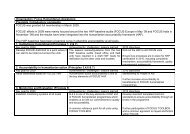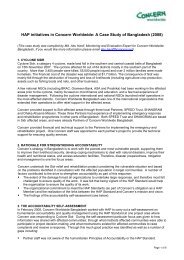Pakistan: Complaints Handling Mechanism - HAP International
Pakistan: Complaints Handling Mechanism - HAP International
Pakistan: Complaints Handling Mechanism - HAP International
Create successful ePaper yourself
Turn your PDF publications into a flip-book with our unique Google optimized e-Paper software.
CASE STUDY<br />
Medair <strong>Pakistan</strong> Earthquake Response Programme<br />
<strong>Complaints</strong> <strong>Handling</strong> <strong>Mechanism</strong>, March 2006<br />
1. Executive summary<br />
Medair responded to the Kashmir earthquake on 8 th October 2005 with an emergency shelter programme. In<br />
order to cope with the deluge of requests for help and complaints being received, Medair implemented a<br />
complaints handling mechanism in December 2005. The complaints mechanism was simple and proved<br />
effective, allowing Medair to maximise its programme coverage in Poonch district and to cultivate a good<br />
level of trust within the community.<br />
2. Medair <strong>Pakistan</strong> Programme<br />
At 8:50 am <strong>Pakistan</strong> time on 8 th October 2005, an earthquake measuring 7.6 on the Richter scale hit Northern<br />
<strong>Pakistan</strong>. The affected area was approximately 30,000 square miles leaving 2.5 million people homeless<br />
(Government of <strong>Pakistan</strong> figures).<br />
A Medair team was on the ground 5 days later and focused on Poonch district in <strong>Pakistan</strong> administered<br />
Kashmir, largely because it had been neglected by other <strong>International</strong> agencies. The initial survey revealed<br />
the majority of buildings in Poonch were damaged or destroyed by the earthquake, 95% in some areas.<br />
Medair implemented an emergency shelter and NFI (Non Food Item) programme providing 6,100 families<br />
with temporary shelter materials or a winter tent and around 10,000 families with an NFI package to ensure<br />
survival over the winter months.<br />
Medair targeted the most vulnerable families whose homes had collapsed or had become uninhabitable. The<br />
team visited earthquake affected villages to explain our criteria for providing assistance, as well as our<br />
organisational mandate. The community provided Medair with lists of damaged houses. In turn, Medair sent<br />
out ‘Assessment, Verification and Monitoring Teams’ to the villages to verify house-by-house the names on<br />
the list. Once verified the Distribution Team used the lists to distribute temporary shelters. This system,<br />
although appropriate at the outset, was crude and the team quickly realised a complaints mechanism was<br />
required to address two particular issues:<br />
2.1 Amount of requests<br />
Villagers were coming to the sub-offices at all times, petitioning Medair staff for help. Furthermore teams in<br />
the field would be regularly harassed by people overlooked from the initial assessment and verification. A<br />
small scale industry in the project area was set up by entrepreneurial printing shops, producing request and<br />
complaints forms, translated into English, meaning that with very minimal effort anyone could complain.<br />
The volume and method of collecting complaints resulted in a major hindrance to programme staff, and also<br />
meant complaints were handled initially in an ad hoc way.<br />
2.2 Bias in requests<br />
Many of the requests coming from government officials were unreliable due to bias in the communities. In<br />
Poonch district there are very strong extended family systems, 5 dominant tribes, 2 religious groupings of<br />
Islam, and 3 highly active and socially engaged political parties. Some community members considered<br />
these affiliations to be their ultimate loyalties. Therefore it was essential to verify all requests fairly and<br />
thoroughly.<br />
3. The complaints mechanism<br />
Initially, one specific hour was dedicated to complaints handling per day at each base. During this hour, the<br />
complainant could speak to either the Administrator or if necessary the Office Manager and describe their<br />
issue. The complainant could submit their own complaint form, Medair also completed a standard
complaints form, detailing all the relevant information to pass on to our assessment teams to check in the<br />
field. This was the only time and place that Medair would receive complaints. The information describing<br />
the complaints mechanism was posted outside our offices, and was also communicated to the community by<br />
Medair field teams.<br />
The main complaint received was from earthquake survivors who had not been selected to receive a shelter<br />
but felt they were deserving. Many complaints were received from people outside Medair’s project area, in<br />
which case Medair lobbied the responsible agency and if nothing happened, Medair considered providing<br />
help ourselves.<br />
<strong>Complaints</strong> were filed according to location. The breakdown of the data was entered on a spreadsheet,<br />
detailing; numbers of complaints per village, details of how many complaints had been addressed, how many<br />
had not, and the total percentages for both. This was updated daily and allowed the teams to assess their<br />
progress as well as linking into programme planning. The Assessment team took the complaints to the<br />
specific village and verified whether they were legitimate or not. If the complaint was upheld, the<br />
beneficiary received assistance, depending on Medair’s resources.<br />
<strong>Complaints</strong> relating to Medair staff members were filtered to the Project Manager at each base and<br />
investigated personally.<br />
Complaint not<br />
from Medair’s<br />
project area<br />
Responsible<br />
organisation<br />
lobbied with<br />
complaints<br />
Complaint received<br />
Information compiled by<br />
office team and<br />
disseminated to field team<br />
Assessment team verifies the<br />
complaints in Medair project<br />
area<br />
Complaint from Medair’s<br />
project area<br />
Complaint upheld<br />
Complaint not upheld<br />
Beneficiary receives<br />
shelter or NFI<br />
Complaint rejected<br />
4. Results<br />
At the end of the emergency phase of the Medair programme, approximately 70% of complaints had been<br />
addressed. Of the complaints addressed 18% were upheld, which in turn meant that 82% were spurious.<br />
Abbas Pur base Hajira base Total<br />
Total No of complaints received 1257 1033 2290<br />
No. of complaints dealt with 880 710 1590<br />
No. of complaints verified 140 150 290
The reason that 100% of complaints were not addressed was that by March 2006, Medair had exhausted<br />
project funds and did not want to verify any further households thereby creating a false expectation that we<br />
could respond, when Medair no longer had any materials. Furthermore the vast majority of homes, 5 months<br />
after the earthquake, had since been rehabilitated and the harsh winter conditions had passed<br />
<strong>Complaints</strong> relating to staff resulted in personal investigations by Medair management. 3 of these<br />
investigations resulted in the premature termination of contracts. These staff members had abused their<br />
responsibilities by favouring tribal or family members.<br />
This sort of check and balance was made possible through a transparent and open complaints mechanism<br />
where beneficiaries felt they could express problems about field staff to management. As a result of these<br />
complaints, systems were reviewed to ensure that bias could not influence distributions again.<br />
5. Benefits to the programme<br />
The complaints mechanism saved Medair teams a significant amount of time and hassle in the field and the<br />
office. From a programme point of view it also saved Medair time in identifying gaps in coverage.<br />
As a result of the complaints mechanism we were able to serve 290 additional families who otherwise would<br />
have been overlooked. The integrated nature of the system allowed for a rapid response and a limited time<br />
burden to the teams.<br />
Being a new organisation to <strong>Pakistan</strong>, the complaints mechanism helped compensate for our limited local<br />
knowledge and acted as a check and balance against staff dishonesty. By the end of the project communities<br />
would contact Medair about any discrepancy they felt in the distributions, confident that Medair would carry<br />
out an investigation.<br />
6. Lessons Learned<br />
6.1 Early implementation<br />
The complaints mechanism started from mid December 2005, 2 months into the emergency. It was still very<br />
useful and began before the onset of harsh winter conditions, but more benefits would have been realised,<br />
had this approach been implemented at the start of the programme.<br />
6.2 Signboards and suggestion boxes<br />
A method which encouraged the most vulnerable in villages to complain would have been helpful.<br />
Signboards could have been erected in the local language in each village, detailing beneficiary selection<br />
criteria, organisational mandate, and information on the Medair complaints mechanism. There could also<br />
have been a suggestion box at each signboard ensuring anonymity for sensitive complaints.<br />
6.3 More dedicated staff<br />
The complaints mechanism was successful in this emergency as it was simple and integrated. It was felt that<br />
an autonomous complaints body would have been time consuming and less responsive. In retrospect more<br />
Medair staff could have been dedicated to handling complaints<br />
7. Conclusion<br />
The complaints mechanism was simple, effective and cost efficient. The integrated approach allowed the<br />
teams to implement the mechanism without changing the programme or staff structure and assisted Medair<br />
in improving overall coverage. Importantly the mechanism built up a level of trust between Medair and the<br />
communities and enabled Medair to be seen as accountable and responsive.<br />
John Primrose, Medair Project Manager, Kashmir – March 2006.




